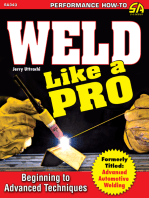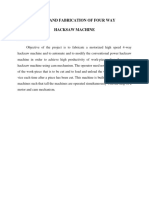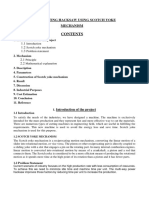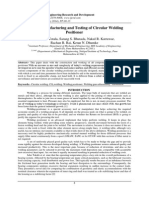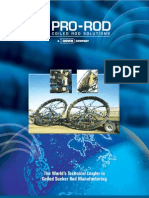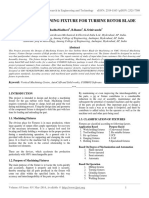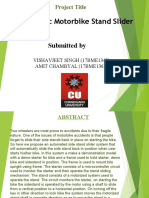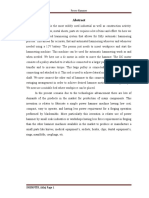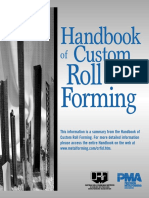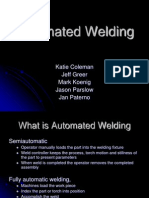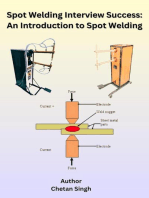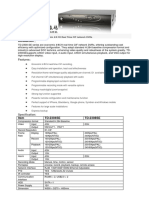word
word
Uploaded by
mebrahtuCopyright:
Available Formats
word
word
Uploaded by
mebrahtuCopyright
Available Formats
Share this document
Did you find this document useful?
Is this content inappropriate?
Copyright:
Available Formats
word
word
Uploaded by
mebrahtuCopyright:
Available Formats
Scope
The scope of this research has been covered designing of wire straightening and cutting
machine, design main components of the feeding systems with good, easily available and
low cost materials. In addition to this conceptual design of the material, the main
components of feeding system. Using standard procedures and design considerations as
well as specifications was investigated. All designs were done on a small scale.
Abstract
A cutting machine for manufacturing wire-like rods, particularly for electrodes for
welding. It comprises at
least one advancement assembly adapted to receive and produce the advancement of a
wire- like product at a preset
advancement speed from an inlet to at least one cutting assembly which is adapted to cut
the wire- like product into rods
of preset lengths. The cutting assembly being interposed, along the advancement line of the
wire- like product between the
advancement assembly and at least one assembly for collecting the rods the cutting
assembly comprising at least two
rotating shears of the motorized type with rotation axes which are parallel and mutually
opposite with respect to the
advancement line of the wire-like product. Synchronization means being further comprised
which are associated with the
cutting assembly and with the advancement assembly for the adjustment of the tangential
speed of the reciprocating
shears. This project deals with increasing the production rate of the machine from
100rods/minute to 200rods/minute and
reducing the down time of production.
A cutting machine for manufacturing wire-like rods, particularly for electrodes for welding. It comprises
at least one advancement assembly adapted to receive and produce the advancement of a wire-like
product at a preset advancement speed from an inlet to at least one cutting assembly which is adapted
to cut the wire-like product into rods of preset lengths. The cutting assembly being interposed, along the
advancement line of the wire-like product between the advancement assembly and at least one
assembly for collecting the rods the cutting assembly comprising at least two rotating shears of the
motorized type with rotation axes which are parallel and mutually opposite with respect to the
advancement line of the wire-like product. Synchronization means being further comprised which are
associated with the cutting assembly and with the advancement assembly for the adjustment of the
tangential speed of the reciprocating shears.
kitchen baskets, automobile spark plugs and exhaust valves etc. For manufacturing all above
products, wire is used as primary element and is to be straighten from coil form. Now straighten wire
is to be cut into wire rod as per required length. For these sequential operations, wire straightening
cutting machine is used. Now days, conventional type wire straightening cutting machine are being
used in which wire is cut by stopper cutter head which is limited by its length as well as feeding speed.
This paper surveys straightening and cutting process used in such machines. Although this review
cannot be collectively exhaustive, it may be considered as a valuable guide for researchers who are
interested to develop next generation of wire straightening cutting machines.
Problem
Now a days, the wire straightening cutting machine is importing from foreign countries.
By observing this problem, we initiated to design this machine with locally available materials
and low cost. After reviewing different literatures; we compared different materials to select the
material with lower cost and good mechanical property. The cutting system of the available
WSCM is computer programmed stopper cutter. But we replace it by continuous cutter scotch
yoke mechanism for easy, accurate and low cost design. Finally, following our design results we
conclude that WSCM we designed can replace the available WSCMs.
This project presents a design and development of a Motorized Cutter
(Mechanical Part) that considers strength, durability, light in weight, easy to
use and safe,
save time and ergonomic factor.
The main problem motivated us design Wire Straightening and Cutting Machines (WSCM) is
unavailability of the machine on local markets and higher purchasing, transportation and spare
part costs of the imported (WSCM )from foreign countries. As a result, it is not easy to afford
by local entrepreneurs and business owners. Similarly during operation time when the machine
get technical problem it is not easy to find the spare parts at the desired time.
This machine has been specially designed to
solve the problem of framing the grating
panels ; it welds the banding bars ( frame)
to the bearing bars.
The panels lock is guaranteed by hydraulic
vices, which ensure an optimum contact with
the bottom fixed electrode.
When introducing the frame to be welded into the machine, a
series of electro magnets provides to place it in convenient
position, in line with the moving electrodes, which are driven by
the welding heads.
significant
Control of wire shift drive and of straightening unit provides for variability of simple parameter
adjustment of wire straightening, and that enables wire with various quality, rigidity and surface
treatment to be straightened.
Production is anxious to meet the
requirements of the rapidly developing "welding industry; it is possible only
by putting welding electrodes of ever higher performance on the market.
Though welding electrode is a highly consumable industrial item, the success of this project depends
on marketing, financial planning and production of quality electrodes.
The requirement of welding electrode is directly proportional to the steel production in any country.
Electrodes are needed both in bulk and small quantity of production. The most important factor in
marketing this product is consumer satisfaction and this can be achieved by producing good quality
electrodes and selling at the most economical price with the best sales network. So it is you to decide
the potential project which is at your door step to make you successful.
This project deals with increasing the production rate of the machine from 100rods/minute to
200rods/minute and reducing the down time of production.
CONCLUSION
By this project we are concluded that by using this device we can reduce material handling time
and cost and also reduce the production cost and increases plant efficiency. Possibilities of
accidents are also reduced.
Thus, by making some necessary modifications the productivity of the machine has been increased. In addition to
this for decreasing the downtime while using base design that increases the productivity. In order to get the accuracy
in the quantity in the collecting unit a load cell arrangement is suggested as per the circuit diagram mentioned
different diameter wires, suggestion has been made for the modification of spinner
The technique developed provides a method for choosing
the necessary number of bending cycles at the stage of
technological procedure designing based on real properties of a
material as well as for visual evaluation of distribution of
stresses in cross section of a wire at different stages of
deformation. Further the different elements described can be
used for modeling one of the perspective operations of
machining which is a rotating straightening.
Recommendations
Further research should be carried out on how to minimize vibration and noise during
operation.
As per our design shows we recommended that using cast iron material is
preferable for manufacturing of pulleys, gears, rollers and shafts as cast iron
have low cost and suitable mechanical properties to them. And also we
recommended that to use a scotch yoke mechanism for cutting the wire as
scotch yoke mechanism is simple, accurate and has few parts or
components.
From the case study, we concentrated on design of a simple mechanical screw jack
where the nut is fixed in a
Cast iron frame and remains stationary while the spindle is being rotated by the lever.
This design can only work for light loads hence when a screw jack is needed for heavy
load application a different design is required where the nut is rotated as the spindles
moves. We therefore recommend design of a screw jack for the heavy loads.
You might also like
- Weld Like a Pro: Beginning to Advanced TechniquesFrom EverandWeld Like a Pro: Beginning to Advanced TechniquesRating: 4.5 out of 5 stars4.5/5 (6)
- 2 - Site Crisis Management Plan TemplateDocument42 pages2 - Site Crisis Management Plan Templatesentryx1100% (7)
- Close Up B1+ Quizzes, 2EDocument37 pagesClose Up B1+ Quizzes, 2EWGaara Nguyen83% (6)
- Progress ReportDocument7 pagesProgress ReportCh ZiaNo ratings yet
- 4 Way Hacksaw MachineDocument8 pages4 Way Hacksaw Machinepandi67% (3)
- Experimental and Analysis of Welding Electrode Wire Straightening and Cutting MachineDocument14 pagesExperimental and Analysis of Welding Electrode Wire Straightening and Cutting MachineTarig shgool HagarNo ratings yet
- Mini Table Saw ProjectDocument17 pagesMini Table Saw ProjectnageshNo ratings yet
- Designing and Fabrication of Double Acting Hacksaw MachineDocument6 pagesDesigning and Fabrication of Double Acting Hacksaw MachineVARSHAN HARIGANTHNo ratings yet
- Naald 5LDocument3 pagesNaald 5Lpil;zoNo ratings yet
- Titanium Impeller Welding MKTG RevBDocument6 pagesTitanium Impeller Welding MKTG RevBKatie RamirezNo ratings yet
- Four Way Hacksaw Machine Ijariie2053Document6 pagesFour Way Hacksaw Machine Ijariie2053ParvezRazaNo ratings yet
- ReportDocument4 pagesReportTanjid Al TajimNo ratings yet
- Electricity Generator Tiles ProjectDocument18 pagesElectricity Generator Tiles Projectanimationindia3No ratings yet
- International Journal of Engineering Research and DevelopmentDocument8 pagesInternational Journal of Engineering Research and DevelopmentIJERDNo ratings yet
- Ieee Chapter 2Document7 pagesIeee Chapter 2Apple DocasaoNo ratings yet
- Fabrication of Wire Pealing Machine - SynopsisDocument2 pagesFabrication of Wire Pealing Machine - SynopsisAnonymous Clyy9NNo ratings yet
- Vijay SCOTCH YOKE MECHANISM DOUBLE ACTING HACKSAWDocument31 pagesVijay SCOTCH YOKE MECHANISM DOUBLE ACTING HACKSAWSergio PugazhNo ratings yet
- RoboticDocument3 pagesRoboticmahotkatNo ratings yet
- Secure Fencing Products Best Welded Wire Mesh MachineDocument28 pagesSecure Fencing Products Best Welded Wire Mesh MachineSecure Fencing ProductsNo ratings yet
- AUTOMATIC PIPE CUTTING MACHINE EditedDocument25 pagesAUTOMATIC PIPE CUTTING MACHINE EditedrajeshNo ratings yet
- Final PPT CapstoneDocument22 pagesFinal PPT Capstonekshitu gargNo ratings yet
- Robotic Arc WeldingDocument56 pagesRobotic Arc Weldingamirhazwan100% (1)
- Pro Rod BrochureDocument9 pagesPro Rod BrochureMIRCEA1305No ratings yet
- Final Year ProjectDocument23 pagesFinal Year ProjectKarthik SubramaniNo ratings yet
- Ijireeice 2022 10509Document5 pagesIjireeice 2022 10509Prajwal TilekarNo ratings yet
- Power HacksawDocument30 pagesPower Hacksawbilal shaikh100% (4)
- Semi - Outer Thread Cutting MachineDocument4 pagesSemi - Outer Thread Cutting MachineTechnico TechnocratsNo ratings yet
- Design of Machining Fixture For Turbine Rotor BladeDocument14 pagesDesign of Machining Fixture For Turbine Rotor BladeesatjournalsNo ratings yet
- Robot WeldingDocument19 pagesRobot WeldingPranay GaddamNo ratings yet
- Nexans CableDocument8 pagesNexans CableQwerty1992ABCNo ratings yet
- Battery Drive Motorized Agriculture Weeder Submitted By: Project TitleDocument19 pagesBattery Drive Motorized Agriculture Weeder Submitted By: Project TitleKaushal DarshanNo ratings yet
- Pipe Inspection RobotDocument13 pagesPipe Inspection RobotJeevan Landge PatilNo ratings yet
- Literature Review of Pedal Operated HacksawDocument4 pagesLiterature Review of Pedal Operated Hacksawbctfnerif100% (1)
- Fabrication of Wire Drawing MachineDocument11 pagesFabrication of Wire Drawing MachineJuan Carlos del ReyNo ratings yet
- 360° Welding Cutting Rotary Turn Table Welding PositionerDocument4 pages360° Welding Cutting Rotary Turn Table Welding PositionerSanath KumarNo ratings yet
- Automatic MotorBike Stand Slider 2020Document16 pagesAutomatic MotorBike Stand Slider 2020abhishek100% (2)
- Batch-1 PPT First ReviewDocument29 pagesBatch-1 PPT First ReviewAnbana VankkamNo ratings yet
- Low Cost Automation For Manufacturing of Conveyor Chain BushesDocument6 pagesLow Cost Automation For Manufacturing of Conveyor Chain BushesRobinson PrabuNo ratings yet
- Literature Review Welding FixtureDocument7 pagesLiterature Review Welding Fixtureaebvqfzmi100% (1)
- Pedal - Powered - Washing MachineDocument17 pagesPedal - Powered - Washing MachineFaiyu MechNo ratings yet
- Documentation (1) 2 2Document78 pagesDocumentation (1) 2 2sure516v100% (1)
- Development of A Six-Axis Wire Electrical Discharge Machine For The Fabrication of Micro End MillsDocument11 pagesDevelopment of A Six-Axis Wire Electrical Discharge Machine For The Fabrication of Micro End MillsmarkrichardmuradNo ratings yet
- Design and Fabrication of 4 - Way Hacksaw Machine: Department of Mechanical Engineering 2018Document28 pagesDesign and Fabrication of 4 - Way Hacksaw Machine: Department of Mechanical Engineering 2018Shailendra VermaNo ratings yet
- Automation in IndustryDocument4 pagesAutomation in IndustryFirozNo ratings yet
- Automatic Bar Feeding Mechanism For Pipe Cutting Machine: 1.1 Full Automation 1.2 Semi AutomationDocument12 pagesAutomatic Bar Feeding Mechanism For Pipe Cutting Machine: 1.1 Full Automation 1.2 Semi AutomationHarshal PatilNo ratings yet
- Combi-Casters For The Production of Blooms and Beam Blanks - An All-In-One Solution For Top Production FlexibilityDocument8 pagesCombi-Casters For The Production of Blooms and Beam Blanks - An All-In-One Solution For Top Production FlexibilityAmit Ranjan KumarNo ratings yet
- Research Paper Development of Motorized Power HammerDocument5 pagesResearch Paper Development of Motorized Power Hammerraja maneNo ratings yet
- Motorised Hammer Project ReportDocument35 pagesMotorised Hammer Project ReportRaja ManeNo ratings yet
- Low Cost Automation For Manufacturing of Conveyor Chain BushesDocument6 pagesLow Cost Automation For Manufacturing of Conveyor Chain BushesIOSRJEN : hard copy, certificates, Call for Papers 2013, publishing of journalNo ratings yet
- Roll HANDBOOKDocument12 pagesRoll HANDBOOKMatija RepincNo ratings yet
- Final 1Document43 pagesFinal 1cejoshua42No ratings yet
- Chapter 1 MergedDocument60 pagesChapter 1 MergedArunkumarNo ratings yet
- 52-56Document5 pages52-56Aswin KarthickNo ratings yet
- Chapter 1Document18 pagesChapter 1YogendraSinghNo ratings yet
- InternshipDocument17 pagesInternshipsoumyaNo ratings yet
- Final Automated Welding PresentationDocument26 pagesFinal Automated Welding PresentationAbie RexoMenNo ratings yet
- A Project Report Gearless Power TransmissionDocument29 pagesA Project Report Gearless Power Transmissiondon131188No ratings yet
- Productivity improvementDocument9 pagesProductivity improvementSiddharth ShahNo ratings yet
- Presentation On Bearing Remover ProjectDocument27 pagesPresentation On Bearing Remover ProjectKingov Misrak ChoraNo ratings yet
- Am ItDocument27 pagesAm Itakalbhor90No ratings yet
- Takayama 2016Document4 pagesTakayama 2016Varun GuptaNo ratings yet
- Spot Welding Interview Success: An Introduction to Spot WeldingFrom EverandSpot Welding Interview Success: An Introduction to Spot WeldingNo ratings yet
- aDocument3 pagesamebrahtuNo ratings yet
- CH Eg 6331 WWTCharDocument24 pagesCH Eg 6331 WWTCharmebrahtuNo ratings yet
- Biodegradation and Bioremediation (2014)Document48 pagesBiodegradation and Bioremediation (2014)mebrahtuNo ratings yet
- Env Microbiolology For Environmental Engineers (ChEg 6303)Document51 pagesEnv Microbiolology For Environmental Engineers (ChEg 6303)mebrahtuNo ratings yet
- Isdh 2019 Sponsorship ProspectusDocument12 pagesIsdh 2019 Sponsorship Prospectusyos_peace86No ratings yet
- Project Engineer ResumeDocument8 pagesProject Engineer Resumeqrhxvwljg100% (1)
- ABE-Stat, A Fully Open-Source and Versatile Wireless Potentiostat Project Including Electrochemical Impedance SpectrosDocument10 pagesABE-Stat, A Fully Open-Source and Versatile Wireless Potentiostat Project Including Electrochemical Impedance SpectrosGuilherme H. De MarchiNo ratings yet
- Multiplication As Repeated Addition Worksheet 1Document8 pagesMultiplication As Repeated Addition Worksheet 1Rhosselle MillenaNo ratings yet
- Difficult Riddles For Smart Kids 300 Dif PDFDocument7 pagesDifficult Riddles For Smart Kids 300 Dif PDFPai Buabthong0% (1)
- 2014 - Predicting The Price of Used Cars Using Machine Learning Techniques PDFDocument12 pages2014 - Predicting The Price of Used Cars Using Machine Learning Techniques PDFSameerchand PudaruthNo ratings yet
- Batch Management in SAPDocument30 pagesBatch Management in SAPerpdocs100% (2)
- Final ReportDocument50 pagesFinal ReportAlex FezeuNo ratings yet
- Empowerment Technologies: 3 Quarter Week 2Document11 pagesEmpowerment Technologies: 3 Quarter Week 2Kay Tracey Aspillaga UrbiztondoNo ratings yet
- Jens Riechers Docuemtn For Tasks Task 3Document7 pagesJens Riechers Docuemtn For Tasks Task 3Jens RiechersNo ratings yet
- JAVA (QuestionBank)Document22 pagesJAVA (QuestionBank)Sahil ChauahanNo ratings yet
- Biosensors and Bioelectronics: SciencedirectDocument8 pagesBiosensors and Bioelectronics: SciencedirectVARSHALI SHARMANo ratings yet
- New Smart Watch Announcement Pitch Deck by SlidesgoDocument58 pagesNew Smart Watch Announcement Pitch Deck by SlidesgoshubhamNo ratings yet
- How To Crack IDMDocument3 pagesHow To Crack IDMpetiepan0% (1)
- T Rec G.1051 202303 I!!pdf eDocument34 pagesT Rec G.1051 202303 I!!pdf eTu LHNo ratings yet
- Cambridge Assessment International Education Cambridge ICT StartersDocument8 pagesCambridge Assessment International Education Cambridge ICT Startershavicir349No ratings yet
- ITTO For PMP ExamDocument8 pagesITTO For PMP ExamSalman HussainNo ratings yet
- CorpDocument39 pagesCorpReynaldo Estomata0% (1)
- New Printer Cartridge Detail RecordDocument4 pagesNew Printer Cartridge Detail RecordMob UseNo ratings yet
- TD2308SEDocument1 pageTD2308SEPedro NinalayaNo ratings yet
- 4851 11374 1 SMDocument16 pages4851 11374 1 SMMuhammad RamadhanNo ratings yet
- GEM 803 Chapter 2 (3rd Term) PDFDocument11 pagesGEM 803 Chapter 2 (3rd Term) PDFRalph Justine GuintoNo ratings yet
- Light Sensor Including Photocell and LDR SensorDocument11 pagesLight Sensor Including Photocell and LDR SensorKhairiBudayawanNo ratings yet
- MOC Training 26th Aug-24Document150 pagesMOC Training 26th Aug-24pthtuanNo ratings yet
- A Novel Step-Up Single Source Multilevel Inverter: Topology, Operating Principle and ModulationDocument5 pagesA Novel Step-Up Single Source Multilevel Inverter: Topology, Operating Principle and ModulationBrightworld ProjectsNo ratings yet
- Unit-2 (Part-A) Notes of OOP (KOE-064) Subject by Updesh Jaiswal Given To Students at AKGECDocument8 pagesUnit-2 (Part-A) Notes of OOP (KOE-064) Subject by Updesh Jaiswal Given To Students at AKGECviku9267No ratings yet
- First Periodical Test - Tle 8: Leganes National High SchoolDocument6 pagesFirst Periodical Test - Tle 8: Leganes National High SchoolDorindah DalisayNo ratings yet
- Evaluating FunctionsDocument9 pagesEvaluating FunctionsEden SumilayNo ratings yet
